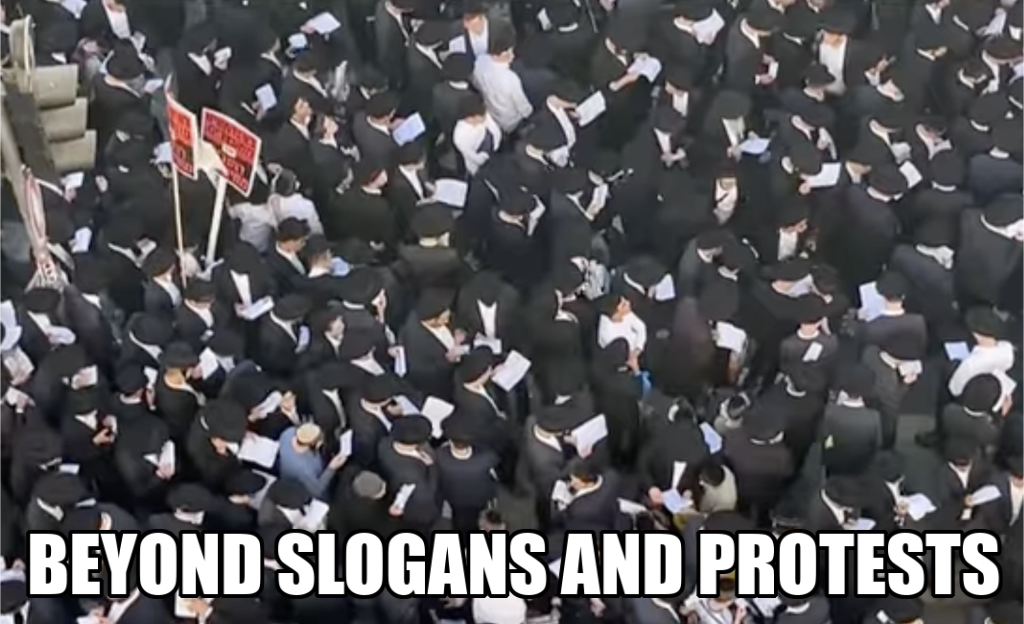BEYOND SLOGANS AND PROTESTS

Two weeks ago, I was on stage at the Saban Theater in Los Angeles for a major Keren Olam HaTorah event. Rabbi Dov Lando and other senior Israeli yeshiva leaders joined about forty or fifty local rabbis, and around fifteen hundred Haredim from across L.A. filled the hall.
The event’s goal was to raise urgently needed funds for full-time Torah learners in Israel. Their government stipends have been cut, and now they are struggling to afford basic necessities.
Let me be clear: those families need help. Their poverty is not “self-inflicted.” They’re part of a system that leaves almost no room for dissent. Anyone who deviates — even slightly — risks social ostracism.
And, to be fair, most Haredim in Israel sincerely believe they are engaged in the holiest project a Jew can undertake: sustaining the world through Torah study. Their idealism is real, their devotion is genuine — and their commitment is breathtaking.
And American Haredim have responded with remarkable generosity. Over $100 million in private donations has flowed to these Israeli families from the United States.
A few days after the L.A. event, Jerusalem saw the so-called “million-man protest” against Haredi conscription. Hundreds of thousands of Haredim from across Israel gathered to oppose efforts to draft them into the IDF. Sadly, the protest ended in tragedy when a young man fell to his death from an unfinished high-rise.
The protest’s message was clear: we will not enlist or take part – this is not our fight. But here is the core issue: Haredim cannot expect to live in and benefit from a country facing real threats without also sharing responsibility for its defense and future.
That approach may have worked when the Haredi community was tiny. It does not work when Haredim make up nearly 14% of Israel’s population and are growing exponentially.
And it does not work when the country is at war and manpower is stretched, and you go about your lives as if the country is not at war, while relying on IDF soldiers and the Iron Dome to protect you.
And it certainly does not work when every other sector — secular, religious-Zionist, traditional, even new immigrants — sends its children off to defend the nation.
Haredim claim, not unjustifiably, that Israel is the land of Jewish heritage and therefore they are entitled to live there, whether or not they serve. But Haredim didn’t flock to Eretz Yisrael under the Ottomans or the British. It was no less “the land of Jewish heritage” then.
Haredim began to come in large numbers — and continue to do so — only once there was a Jewish state. They are right to come. Israel is the greatest blessing for the Jewish people in two thousand years. And let’s be frank — had Israel not prevailed in 1948, and the Arabs had won, there would almost certainly not be a thriving Haredi community in Eretz Yisrael today.
Which means — labels aside — Haredim are part of the Zionist story, whether they embrace the word or not. They may not sing Hatikva or fly the Israeli flag, but they chose the state, and they benefit from it in countless ways.
And let’s say this out loud: no one has ever supported Torah study in all of Jewish history more than the State of Israel. Not even close. Tens of billions of shekels over decades — buildings, stipends, housing allowances, childcare subsidies, food aid programs, and more.
Haredim will tell you, sometimes indignantly, that the support was given reluctantly. Maybe so. But the broader reality remains: if someone pays your bills for decades, reluctance doesn’t erase support. And if you benefit from a state’s stability, security, hospitals, emergency services, roads, schools, and subsidies, you are a stakeholder, whether or not you wave a flag on Yom Ha’atzmaut.
So while Haredim don’t call themselves Zionists, they do live in Israel by choice. They rely on Israel’s institutions. They expect Israel to protect them. Functionally, they are part of the Zionist project.
Which leads to an uncomfortable truth: a community that demands support and respect while signaling indifference to Israel’s broader challenges should not be shocked when such respect is not forthcoming.
Most Israelis don’t hate Torah, nor do they reject the idea of full-time Torah study. But they do hate feeling like suckers. Watching their children serve — and sometimes die — while others march declaring “this is not our army” is painful. It breeds resentment.
Recent statistics reveal that around 75% of Israeli families have at least one child serving in the military, highlighting the widespread burden of military service. This stark contrast between those serving and those who declare their disconnection from the army becomes a tangible source of tension.
And resentment, left unchecked, becomes anger, and eventually a division so deep it threatens the foundations of the state.
To be fair, the blame does not sit solely on one side. There is enormous prejudice toward Haredim in Israel — ignorance, mockery, at times outright hostility — and it’s destructive. But here’s the trick, and it’s hard for everyone: if you want others to respect your contribution, you need to acknowledge theirs.
Torah protects. We believe that. But soldiers protect, too. Medics protect. Pilots protect. Intelligence analysts protect. Volunteers who pull bodies from rubble protect. Israel’s safety is not theoretical — it’s literal.
Our sages taught us not to rely on miracles. The concept of ‘hishtadlut’ alongside ‘emunah’ — effort alongside faith — aligns our spiritual devotion with the practical needs of defense. The spiritual battlefield matters, and so does the physical one. It cannot just be someone else’s problem. It’s everyone’s problem.
Thankfully, things are shifting. Quietly, beneath the noise, something else is happening. Not mass enlistment and not ideological surrender, but something subtler — and perhaps more profound. In a move unimaginable a few years ago, the Belzer Rebbe has backed a pilot IDF track for married Hasidim from his sect, the second-largest Hasidic group in Israel.
About 150 men are already in. They serve in noncombat roles — intelligence, communications, logistics — and they return home nightly, remaining full-fledged Haredim in every way. They don’t carry guns, they don’t do basic training — but they are inside the IDF framework. The program even includes pre-academic training and technician or engineering diplomas.
Let’s not underestimate what this represents. It isn’t surrender, and it isn’t capitulation. It is a bridge — modest for now, tentative perhaps, but real. And like all bridges, it begins with a small span, just enough to show that two sides can, in fact, meet somewhere in the middle. The Belzer Rebbe isn’t waving a flag. He’s opening a door.
And perhaps, just perhaps, this is a glimpse of the Jewish future we need: a future where Torah remains uncompromised and civic duty is not ignored. The million-man march may have mattered this week, but history may well remember far more the quiet courage of those 150 Belzer Hasidim who chose a different path. With God’s help, that is the future awaiting the Haredim of Israel.


